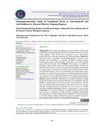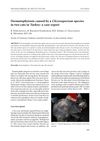 July 2024 in “Plastic and Aesthetic Research”
July 2024 in “Plastic and Aesthetic Research” Careful planning and accurate diagnosis are crucial for successful hair restoration surgery.
 39 citations,
December 2001 in “JNCI: Journal of the National Cancer Institute”
39 citations,
December 2001 in “JNCI: Journal of the National Cancer Institute” Using a gene therapy with the Sonic Hedgehog gene helps mice regrow hair faster after losing it from chemotherapy.
 18 citations,
February 2001 in “Journal of International Medical Research”
18 citations,
February 2001 in “Journal of International Medical Research” Hairgain® significantly increased hair growth and was well-tolerated by individuals with hair loss.
 70 citations,
February 2015 in “Expert Opinion on Drug Discovery”
70 citations,
February 2015 in “Expert Opinion on Drug Discovery” Topical drugs and near-infrared light therapy show potential for treating alopecia.
 224 citations,
March 2006 in “Seminars in Cutaneous Medicine and Surgery”
224 citations,
March 2006 in “Seminars in Cutaneous Medicine and Surgery” The document concludes that understanding hair follicle biology can lead to better hair loss treatments.
 147 citations,
April 1994 in “Drug Safety”
147 citations,
April 1994 in “Drug Safety” Some drugs can cause hair loss or increase hair growth, but these effects are usually reversible when the drug is stopped.
 72 citations,
February 2011 in “American Journal of Biological Anthropology”
72 citations,
February 2011 in “American Journal of Biological Anthropology” The conclusion is that recognizing hair growth cycles can improve the precision of dietary and health assessments from hair analysis.
 8 citations,
January 2013 in “Journal of The Korean Medical Association”
8 citations,
January 2013 in “Journal of The Korean Medical Association” Korean hair is typically thicker with a slower growth rate, and treatments like Dutasteride are effective for male pattern hair loss without major side effects.
 4 citations,
November 2017 in “Scientific Reports”
4 citations,
November 2017 in “Scientific Reports” The research provides a gene-based framework for hair biology, highlighting the Hippo pathway's importance and suggesting links between hair disorders, cancer pathways, and the immune system.
 July 2018 in “Elsevier eBooks”
July 2018 in “Elsevier eBooks” Some drugs can cause reversible hair loss, but certain chemotherapy drugs may lead to permanent hair loss; drugs can also change hair color and texture.
 25 citations,
November 2014 in “Ageing Research Reviews”
25 citations,
November 2014 in “Ageing Research Reviews” Skin aging is caused by stem cell damage and can potentially be delayed with treatments like antioxidants and stem cell therapy.
 3 citations,
January 2015 in “Nasza Dermatologia Online”
3 citations,
January 2015 in “Nasza Dermatologia Online” Some treatments for autoimmune hair loss work, but JAK inhibitors like tofacitinib are promising for regrowth.
 January 2022 in “Acta botanica Caucasica”
January 2022 in “Acta botanica Caucasica” Turkish herbal cosmetics use various plants for hair care, skincare, and other personal hygiene purposes.
 26 citations,
August 2018 in “American Journal of Clinical Dermatology”
26 citations,
August 2018 in “American Journal of Clinical Dermatology” Hair loss in cancer patients can be related to the cancer itself, treatment, or other conditions, and understanding it is important for diagnosis and patient care.
 22 citations,
August 2017 in “Stem cells and cloning”
22 citations,
August 2017 in “Stem cells and cloning” Stem cell technologies and regenerative medicine, including platelet-rich plasma, show promise for hair restoration in treating hair loss, but more research is needed.
 October 2020 in “Veterinary Dermatology”
October 2020 in “Veterinary Dermatology” New treatments and diagnostic methods for various animal skin conditions showed promising results.
 11 citations,
July 2012 in “Current Opinion in Pediatrics”
11 citations,
July 2012 in “Current Opinion in Pediatrics” Skin problems can be signs of hormone-related disorders and recognizing them early is important for treatment.
 53 citations,
March 2014 in “Cold Spring Harbor Perspectives in Medicine”
53 citations,
March 2014 in “Cold Spring Harbor Perspectives in Medicine” The document explains different types of hair loss, their causes, and treatments, and suggests future research areas.
 2 citations,
January 2018 in “Elsevier eBooks”
2 citations,
January 2018 in “Elsevier eBooks” Lipid nanoparticles improve drug delivery through the skin, offering stability, controlled release, and better compatibility with skin.
 March 2017 in “InTech eBooks”
March 2017 in “InTech eBooks” Acne vulgaris is a common skin condition that can cause low self-esteem and depression, and early treatment is important to prevent scarring.
 October 2023 in “Jurnal Farmasi Galenika (Galenika Journal of Pharmacy)”
October 2023 in “Jurnal Farmasi Galenika (Galenika Journal of Pharmacy)” Traditional herbs in Amarasi District may help treat dandruff and hair loss.
 30 citations,
April 2007 in “Dermatologic Clinics”
30 citations,
April 2007 in “Dermatologic Clinics” The document concludes that new treatments are needed to better manage acne and reduce side effects related to current therapies.
 June 2024 in “International journal of molecular sciences”
June 2024 in “International journal of molecular sciences” Adenosine complex helps increase hair thickness and density in hair loss.
 September 2023 in “Irish Journal of Medical Science (1971 -)”
September 2023 in “Irish Journal of Medical Science (1971 -)” About 61% of women who had COVID-19 experienced hair loss afterward.
2 citations,
July 2023 in “Cosmetics” Surfactants in shampoos and conditioners remove some but not all lipids from hair, and more research is needed to understand their full impact.
 November 2024 in “Applied Sciences”
November 2024 in “Applied Sciences” Placenta products might help with hair loss, but more research is needed.
 November 2022 in “IntechOpen eBooks”
November 2022 in “IntechOpen eBooks” Hair loss can significantly impact a person's mental health, causing issues like anxiety and depression, and stress can trigger hair loss.
58 citations,
November 2018 in “Cochrane library” Oral isotretinoin may slightly improve acne but increases the risk of side effects like dry lips and skin; more research is needed to understand its full risks and benefits.
 4 citations,
December 2013 in “Veterinární medicína”
4 citations,
December 2013 in “Veterinární medicína” Two cats and their owner in Turkey were successfully treated for a rare fungal infection with fluconazole.
 1 citations,
November 2016 in “Congenital Anomalies”
1 citations,
November 2016 in “Congenital Anomalies” Get head MRI for babies with achondroplasia early, use free immunoglobulin light chains to detect certain neurodevelopmental disorders, and video calls work for speech therapy in patients with facial anomalies.




























